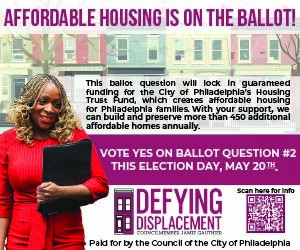Confused about the new property tax system? Curious about how your property taxes or rent will be affected by the Actual Value Initiative (AVI)? There’s a good opportunity to learn more and have some of your questions answered at a neighborhood meeting on the property tax overhaul that will take place this Wednesday, March 13, at 7 p.m. at the Griffith Hall of the University of the Sciences (Woodland Ave & 43rd St). The meeting is organized by Cedar Park Neighbors, Garden Court Community Association, Spruce Hill Community Association, Walnut Hill Community Association, and Woodland Terrace Homeowners Association.
The meeting will include: a representative from the Office of Property Assessment (OPA), Councilwoman Jannie Blackwell’s Office, Dr. Kevin Gillen, Economist, University of Pennsylvania, Patrick Kerkstra, journalist, moderator.
The AVI was devised as a way to make the tax burden more fair citywide: Some residents’ property taxes are going up, others are coming down. The initiative included a mass reassessment of the city’s building stock.








March 12th, 2013 at 2:58 pm
I can’t come to this meeting, but want to ask: is anyone else planning to appeal their assessments? My large dump of a fixer-upper was assessed at least 75K more than any fool would pay for it.
I can’t afford a lawyer, but want to appeal on my own, on the grounds of incorrect market value, and also non-uniformity of assessments on my block. The new assessments on range from $129-455K in a single block, and seem to have been made based on how nicely the exterior was painted.
For the appeal, I am just overwhelmed. I was thinking of writing a letter summarizing the points, and including some photos.
Any ideas from other appealers are appreciated!
March 12th, 2013 at 4:25 pm
The first step is requesting a first level review: http://www.phila.gov/OPA/Assessments/Pages/Appeals.aspx
Due March 31st.
March 12th, 2013 at 4:42 pm
Thanks. I do know about the first level review, but the form to request a first-level review says “you may submit additional material to support your appeal”.
I’m just wondering what kind of additional material would be effective. For starters, I’ll write a letter and include a bunch of photos, but do I need to get a professional assessment? Where one find such a person?
March 13th, 2013 at 8:08 am
There was a useful post on this with a map, earlier in February: https://www.westphillylocal.com/2013/02/18/assessing-the-damage-new-property-values-are-out/
March 13th, 2013 at 11:05 am
Moneypit owner — we’re in the same situation. Our house, a fixer-upper, has the dubious honor of being most expensive on our block, according to AVI. We are baffled when many homes of our street are in pristine condition. The only difference we see is that our house’s facade was deemed as having an above average facade. Clearly the evaluator never saw the inside of our home! We’re going to start by presenting assessments of all the comparable homes on our block as well as photos. We could use additional advice too — please share if you learn more.
March 13th, 2013 at 11:30 am
Perpetual renovator – here are my thoughts so far. My appeal will be on two fronts – market value and non-uniformity. For the market value portion, I am going to document (with photos) the considerable inside damage and work still to be done under our 30-year self-renovation plan, with an estimated cost to complete each item. I will also detail the well-known drug activity and parties on my block (sadly, this is true, and it certainly affects the market value of our block, though it is hard to put a dollar figure on it) which we’ve been enduring for the past 11 years.
For the non-uniformity portion, I am not too sure. I am thinking of a couple of key points: the 300K range among all the new assessments (in a single block? really?), and the fact that all the houses on the block containing rental apartments are assessed at $100K less than the owner-occupied units. Weird, right?
Any other ideas out there?
March 13th, 2013 at 12:20 pm
whoops, in the last part of my message, I meant “owner-occupied houses”, not “owner-occupied units”. Sorry!
March 13th, 2013 at 7:57 pm
Thinking about it, I’m interested in finding out how the evaluations were carried out. Walk-bys? Drive-bys? Sitting in the office and browsing Google street view? how much time did the evaluators spend on each evaluation? What rubrics did they follow? Are we allowed to see the details of the evaluation? and so on.
March 14th, 2013 at 8:10 am
At the meeting last night, Blackwell started by completely dismissing any attempts to collect delinquent back taxes saying those that owe are Philadelphia’s poor who can’t pay and there’s no point in trying because there’s no collecting the money from them anyway.
When the moderator pointed out that nearly 70% of property back taxes are for non-owner occupied properties many owned by speculators and investors who live outside the city, she immediately changed her tune saying that the city should go after those property owners.
A question from the audience revealed that, discounting the past due taxes entirely, not getting these properties to pay currently costs Philadelphia $295 million each year. This amount is enough to cover the school district’s entire annual budget shortfall.
Blackwell, who had been complaining about school closures, said she supported the city getting this money, again in a complete reversal.
Ladies and gentlemen of West Philadelphia…your elected official.
March 14th, 2013 at 11:21 am
Here are the dates and locations of other AVI meetings throughout the city if you couldn’t make the one at USP.
Tonight at 7pm in Northern Liberties – St Michael’s Church, NE Corner of 4th & Fairmount,
6059 Haverford Ave: March 18, 2013, at 6pm at the 19th Police District
3900 Lancaster Ave: March 19, 2013, at 6pm at the 16th Police District
300 W. Shunk St: March 20, 2013, at 6:30pm at the Murphy Recreation Center
4101 N. American St: March 21, 2013, at 4pm at the Pantoja Charter School
1202 E. Montgomery Ave: March 21, 2013, at 7pm at the Fishtown Rec Center
2201 W. Hunting Park Ave: March 25, 2013, at 6pm at the 39th Police District
10th & Moore Sts: March 26, 2013, at 7pm at Neumann/Goretti High School for the Passyunk Square, Lower Moyamensing, Dickinson Narrows, and East Passyunk Crossing AVI Outreach Mtg.
2060 Red Lion Rd and Jamison Ave: March 27, 2013, at 7pm at the American Heritage Credit Union, Community Room for the Greater Bustleton Civic League
March 15th, 2013 at 4:52 pm
I totally agree that collection of delinquent back taxes should be the city’s priority, Anonymous. And I am not surprised by Blackwell’s sad grasp of the facts. And I don’t believe city officials when they say that AVI is a revenue-neutral initiative. It’s clearly meant to be a windfall.
Has anyone else noticed (I am using http://apps.axisphilly.org/avi-map/ for my info) that the owner-occupied properties are assessed 80-100K higher than the properties owned by landlords? This is how it breaks down on my block, and also others I’ve talked to around the city. It’s hard not to see this as a special premium tax on owner-occupants.
I acknowledge that rental properties in general are often (but not always) more dilapidated, but a $100K premium on owner-occupants is completely insane, given that no assessor set foot in any house, nor has any real knowledge of the neighborhoods. It is as though by submitted our requests for the $30K Homestead Exemption, owner-occupants have unwittingly marked ourselves as being in possession of properties with inherently greater value. This is simply an appalling assumption, as city property assessors know next to nothing about the true condition of our neighborhoods and homes, never having set foot inside them nor lived with the nuisances (aka drug activity) we live with.
And thanks, anon, for posting the other meeting dates – I’ll try to make one of them.
March 15th, 2013 at 6:13 pm
Assessments, good or bad, merely are a way to assess the value of properties relative to each other. They don’t set the rates. City Council does. They decide how much revenue to extract from property taxes, wage taxes, business taxes, sales taxes every year when they pass a budget. AVI is revenue neutral if the city collects the same total amount of revenue, which is their plan. Thats a simple fact. The fact that you are a loser in the new calculations just means that someone somewhere else is winner and that you were formerly getting a break on your taxes at someone elses expense. The old assessments were awful, arbitrary and in some instance blatantly corrupt. The new assessments are for the most part an improvement in terms of being based on real data, but they are far from perfect. Still the point is, if your taxes are going up dramatically under the new assessments, its most likely because someone else was previously carrying the burden for you, quite unfairly, for last 20 or 30 years. Back then it sucked to be them, right now it sucks to be you. The fact that something has been broken for a long time is a poor justification for not starting to fix it now.
March 21st, 2013 at 11:02 am
Of course the assessments matter. The proposed 2014 valuations will become the basis upon which the new tax rate (yes, to be determined) will be applied. Therefore it is critical that the valuations be at least somewhat fair & accurate. Even on the lower end of the tax rates being tossed about (1.25 – 1.4 %), the majority of us are looking at increases, and not small increases.
From today’s recap of the AVI meeting in the UC Review (http://ucreview.com/standing-room-only-at-recent-u-city-avi-meeting-p3878-1.htm):
“Five thousand University City homes were included in Gillen’s hypothetical scenario that includes property tax increases of 1.25 percent and no homestead exemptions. Of those 5,000 homes, property taxes could decrease for 1,154 or 23 percent of homes. The property taxes for four homes or zero percent could remain unchanged. Increases of $1-$250 could effect 583 or 12 percent of homes. Increases of $251-$500 could effect 525 or 11 percent of homes. Increases of $500-$1,000 could effect 892 or 18 percent of homes. Increases of $1,000-$1,5000 could effect 640 or 13 percent of homes. Increases of $1,500-$2,000 could effect 250 or 7 percent of homes. And increases of $2,000 or more could affect 767 or 16 percent homes in University City, Gillen explained.”
With 77% of UC residents facing increases, and 54% facing increases of over $500, yes, indeed it sucks to be a UC resident.
Of course the old system was flawed. And yes, you have to start somewhere. But the new system is un-transparent about its methodology, and has already produced substantially inaccurate assessments for many residents. Not all West Philly homeowners are enjoying fixed-up Victorians, and some of us are still living next to slumlords, or with violence and drug activity within sight and hearing.
Finally, I, for one, believe that AVI will affect rents and homeowners’ insurance rates adversely.
Altogether, these points are the basis for my concern about AVI. But maybe it’s too early for this discussion – seems like people will care only when they see their 2014 tax bills next January.